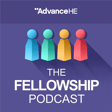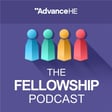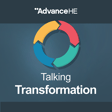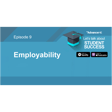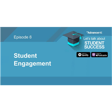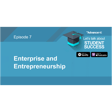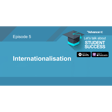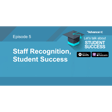Become a Creator today!Start creating today - Share your story with the world!
Start for free
00:00:00
00:00:01

Advocacy and Supporting Statements
This month Louise and the team discuss Fellowship advocacy, and the vital part of the application process which is the Supporting Statement.
They look at what makes a good Supporting Statement, and the impact your advocate can have on your application.
Transcript
Episode Introduction
00:00:14
Speaker
Hello everyone and welcome to episode seven of our Fellowship podcast series.
Meet the Hosts
00:00:19
Speaker
It's hello from me, Louise Lumsden and Raj. Hello everyone, it's Raj Deemar here, Fellowship and Awards Advisor at Advance HE.
00:00:29
Speaker
And Marita? Hello, Marita Grimwood, Senior Advisor for Teaching Fellowships at Advance HE. ah Thank you so much, Raj and Marita. It's lovely to see you today. um And as a reminder to all our listeners, you can get involved with our Fellowship Podcast series via the hashtag AHEFellowshipPodcast.
Recap of Previous Episode
00:00:50
Speaker
um Well, in our last episode, we focused on Associate Fellowship, which is Descriptor 1. of the Professional Standards Framework for Teaching and Supporting Learning.
00:01:01
Speaker
We had a really interesting conversation and thanks ever so much, Raj and Marita, for your insights and helpful suggestions to support any applicants who are in the process of developing an application or anybody who's mentoring those who are in the process of applying for Associate Fellowship.
Understanding Supporting and Advocate Statements
00:01:19
Speaker
And we hope that you found that um information and that session really helpful to support you as you develop your application going forward. um So this episode, we thought it would be really useful to focus on supporting statements and advocate statements.
00:01:39
Speaker
So these are the mechanisms to verify and endorse an applicant's practice. for somebody who is applying for one of the four categories of fellowship.
00:01:50
Speaker
And we thought that this was a really useful opportunity. We've explored all of the categories of fellowship as we've gone along during the series. And we thought that this episode might be helpful um to support how you go about acquiring a supporting statement or advocate statement, for us to explore who might be the best person to approach and the requirements.
00:02:15
Speaker
And these are different for applicants who may apply for a category of fellowship, through their accredited institutional programme or scheme, for example. um For direct application, we'll explain the number of supporting advocate statements and the requirements.
00:02:31
Speaker
um But in an institutional accredited programme or scheme, there might be slightly different arrangements um because a supporting statement might not be, for example, for D1 to D3, the only mechanism to authenticate your practice.
00:02:50
Speaker
So for direct application, um applicants are required for Descriptor 1, Descriptor 2 and Descriptor 3 to provide supporting statements and for Descriptor 4, Principal Fellow, applicants are required to provide advocate statements.
Role and Importance of Referees
00:03:07
Speaker
um And hopefully that sets the scene. And Rad, if I can come to you first, and I wondered if you could just say a little bit about the requirements and the function of of supporting statements.
00:03:20
Speaker
Yeah, very happy to do so, Louise, and thanks for inviting us to talk about this very and interesting aspect of the requirements for particular categories of fellowship. And supporting statements and advocate statements are a key aspect of any category of fellowship, as you said, in terms of very firm endorsing. And In higher education, quite often there are many different things that we are doing where we are looking at making enhancements or improvements, but it can be quite rare to receive ah support or advocation for practice that's actually effective and inclusive. We're often told what's not working or what needs to be improved.
00:04:01
Speaker
Whereas within professional recognition processes um and direct application, it's actually a chance to step back and for an applicant to reach out to relevant ah colleagues or peers as appropriate to the category of fellowship and to request for that verification and endorsement that other people can provide for them on behalf.
00:04:22
Speaker
And those statements are written and received and by the applicant, written by referees or advocates. And it's actually a fantastic way for that practice to be externally seen by others to show actually that what they're doing is effectively inclusive, relevant to the category of fellowship. So if we look at specific categories, Descriptor 1 in a direct application requires one supporting statement. So this would be from the perspective of somebody that perhaps has observed practice, perhaps has been a peer supporter of teaching and learning activities, and there may have been a ah partner in relation to some aspect of design or teaching or support or practice.
00:05:05
Speaker
And the role of the referee is crucial in the sense that alongside the application, the statement has the function of providing that verification.
00:05:17
Speaker
So it's an external perspective of somebody um testifying, in other words, from personal first-hand knowledge of how that applicant is effective and inclusive with respect to the category of fellowship that's being applied for.
00:05:30
Speaker
So a descriptive one, it's one statement that's required and that's typically a side of A4 from somebody that's well known ah to the applicant within recent practice or typically within the last three years.
00:05:41
Speaker
Applicants are all provided with relevant guidance and a template to support the writing of that statement. And I think it's important here to understand the uniqueness of those statements. So making sure that they're independently written by the referee, personalised to the applicant,
00:05:59
Speaker
and working towards the contribution of how the referee knows that the applicant is meeting the requirements of the relevant descriptor, so diop dis up to one in terms of the one statement.
00:06:11
Speaker
um And encapsulating this within side or so of a written statement is then what provides that verification and endorsement that reviewers then use to check that accuracy, to check that authentication, to check that endorsement. um And it really is a celebration of that good practice.
00:06:32
Speaker
What it isn't is ah is a character reference or a job application reference. And sometimes we see these where somebody's writing about somebody's personality or they're recommending someone for a job even.
00:06:44
Speaker
And these aspects are not really required for what we are wanting in professional recognition. So those nuances in terms of the criteria, the application requirements, and it's a bit like a ah triangulation between the known personal knowledge of the referee to the applicant, the applicant's application itself, and then the requirements of the descriptor.
00:07:03
Speaker
And between them, is what then creates the unique statement. And they should be fairly, I say fairly straightforward, but they should be straightforward to create because of that personal relationship with the individual.
Requirements for Supporting Statements
00:07:17
Speaker
Now, when I say personal relationship, what I mean there is that there's a professional relationship between the applicant and the referee. There are parameters in terms of conflicts of interest, for example. So you wouldn't have someone that's a friend or a family member act as a referee normally. You'd have someone that's working with you in a professional capacity.
00:07:34
Speaker
And when we look at D2 and D3, so fellowship and senior fellowship, both those categories require two supporting stick, two independent referees, a very fun endorsing practice for fellowship and for senior fellowship.
00:07:48
Speaker
And critical to that as well, um extending the discussion on descriptor one for a associate fellow is that the nature of the examples in those supporting statements needs to reflect the category of fellowship.
00:08:01
Speaker
So for descriptor two, the statement will be about the direct professional practice of the applicant with their learners in units, courses, programs, services, and how that is known to be effective and inclusive.
00:08:15
Speaker
from the referee's first hand knowledge of the applicant's work. So it's all about that direct knowledge. Whereas for descriptor three, the nature and purpose of the statement needs to be about the leadership and influence of the applicant's practice. And therefore, examples in the statements that are provided not be about direct teaching and learning practice,
00:08:35
Speaker
There might be some of that to kind of set context, but the main focus and the bulk of the statement should be about the effective inclusive leadership and influence examples that the referee knows about in terms of applicant's practice. and So those distinctions are really important to be aware of and mindful.
00:08:53
Speaker
and particularly in the case where um a referee may not be familiar with the PSF but they become familiar as part of the process or they may not be a fellow themselves.
00:09:04
Speaker
So the requirements are really quite key in relation to driving the appropriate creation and submission of supporting statements. so I've chucked in a few different angles there that we can certainly explore further as we we go along.
00:09:20
Speaker
I think, um thank you Raj and I think what's absolutely key and critical is that the referee knows the applicant's practice and knows it well to be able to verify and endorse that practice and when we look at the template that particularly coming direct to Advance HE, the person writing the supporting statement, the referee, has to confirm that they have read the application.
00:09:48
Speaker
So we'll come on to the process side of things, I'm sure, later on. But as part of the process... the applicant should be sharing, know, as much in advance as they can with their supporter, with their referee, so that they have opportunity to read and verify and endorse the practice that they know about.
00:10:08
Speaker
And I think that that's really
Advocate Statements for Principal Fellowship
00:10:10
Speaker
key. So thank you, Raj, for talking through us, Descriptor 1 to Descriptor 3. And Marita, if we can just come now to Principal Fellow, because Principal Fellow is slightly different and its applicants are providing advocate statements.
00:10:27
Speaker
That's right. Thank you, Louise. There are advocate statements. And the first most obvious difference for principal fellowship is that we are asking for three of them from direct applicants.
00:10:40
Speaker
And this is because it's a sort of quality market, if you like. If you're a principal fellow operating within an institution, then people will, the people, um and you're applying through an institutional pathway, people will be expected to to know you.
00:10:56
Speaker
ah But we we are, you know, our reviewers are approaching your application without knowledge of your institution and your context. So it's sweet feel that it was felt that the um having that extra advocate statement well was helpful here.
00:11:15
Speaker
And there are quite specific requirements of the advocates as well. So in principle, it's the same as all the other categories, but there are some specific points to bear in mind.
00:11:28
Speaker
So as an advocate, or your advocate, when if you are the person choosing your advocates, should be able to comment on the practice described it from at least one of three perspectives.
00:11:46
Speaker
And these perspectives are how you've been how you've been directly influenced by the applicant's practice. if the um they You
Selecting Advocates or Referees
00:11:58
Speaker
need to be from a higher education provider And finally, external to the institution if the applicant is employed rather than self-employed.
00:12:12
Speaker
So there are a couple of things to say about that. So you could have an advocate who was both um external to your institution and commenting on how they've been directly influenced by you.
00:12:29
Speaker
And then you might have two other advocates who are from higher education providers and obviously um and and corroborating your practice, different parts of your practice.
00:12:42
Speaker
So it could technically be one of your advocates who is all of those three things once. It's just that that needs to be, those points need to be covered off.
00:12:53
Speaker
by your three advocates between them and then the external advocate is a really interesting one because we see people being asked for replacement advocate statements quite a lot yeah because their external advocate isn't really that external.
00:13:13
Speaker
of Now, the point of this is to show that you are, as an applicant, you have networks and you are engaged beyond your institution and you have some recognition and are able to get some corroboration from beyond your institution.
00:13:34
Speaker
Now, if a lot of your impact at strategic level is external, that would probably happen naturally. Anyway, you would you would choose at least one advocate who could endorse that practice.
00:13:47
Speaker
If your impact is all or mainly internal, it may be that your external advocate is more somebody in your wider networks, maybe somebody who's familiar with the work you've done.
00:14:04
Speaker
They've perhaps seen it evolve and they understand how it's been effective and they're able to share their perspective on this. So in that case, they might well be someone one who has who is writing about your direct influence on their leadership practice.
00:14:23
Speaker
I think the external advocates really important, Marita, and irrespective of you, you are applying direct to Advance HE or going through your own institutional scheme.
00:14:35
Speaker
you would be required to provide an external advocate statement. And I think that's expected, isn't it, due to the nature of the category of fellowship? Exactly. If you're operating strategically, it will be expected that you would be situating your work in some way in a context beyond your own institution. Now, where you tend to get confusion here is when people invite someone who's a former colleague for example, to be and advocate.
00:15:08
Speaker
And this might be appropriate, but only if that person is able to endorse practice outside their capacity as a former colleague.
00:15:18
Speaker
So if they're writing about when they worked with um the applicant as their line manager or their um or their colleague and say, yes, we worked together, we did that, that's actually an internal advocacy movement.
00:15:33
Speaker
So that's something that catches people out. And sometimes as well, somebody is technically external, let's say they're an emeritus member of academic staff, and they are they've had a long association with the institution, and they're now continuing to collaborate on projects.
00:15:53
Speaker
And that doesn't, that's not got the externality that we'd be looking for. So it's something to be very mindful of. um Thank you, Marita. And I think, you know, that that explanation and clarification will be appreciated because, as you say, it can often, there can be some blurred boundaries and, you know, is the external really external? So i think those are really things to be mindful about.
00:16:21
Speaker
And I think, you know, to both yourself and Marita, both yourself, Marita and Raj, I think that just brings me on to, you know, as you As you're developing your application, you might suddenly think, oh, I need supporting statements. you know What would be the optimum time to actually start thinking about who might be your advocate, who might be your referee for a supporting statement?
00:16:45
Speaker
When should you approach and you know who might you approach? Have you got any um hints and tips for potential applicants?
00:16:55
Speaker
Well, in terms of when, I think as soon as you know for certain which examples of practice you're using, you can start to approach your advocates.
00:17:09
Speaker
Because if you're deciding between which examples to use, it may be that different different advocates, different referees would be more appropriate depending on which ones you actually do to focus on.
00:17:24
Speaker
So at that point, you shouldn't do it before before then. Equally, it's good to get people on board quite early on and give yourself give yourself some time, um because partly because they say very useful things.
00:17:40
Speaker
in their statements. And sometimes we see applications where the advocate or the referee has written about some wonderful work that the applicant has done that would have been entirely appropriate to include in their application and would have really helped their case.
00:18:00
Speaker
But for some reason, um the applicant hasn't hasn't done that. So it is worthwhile to give yourself time to be able to amend your application if that happens to you and you realise you've missed something else that could be quite important.
00:18:17
Speaker
Yeah, I think think this the supporting advocate statements, although might initially feel perhaps a bit daunting about who you might ask or who who has the time and capacity, people are busy, etc, etc. But it really is the chance that you deserve, that an applicant deserves to get that verification and endorsement. And it's kind of within your rights, it's within your gift.
00:18:39
Speaker
to to request that. And yes, people are really, really busy. And of course, there'll be some people that will be the go-to referee or the go-to advocate and may get asked all the time. and But really, it's is just the opportunity to kind of have that in mind. and kind of There's never a perfect time, I think, but when you're and relatively close to finalising, perhaps got a few months to go um in terms of your final internal deadline or if you're applying directly to Advanced HE, to prime your referees or advocates in advance to know that.
00:19:11
Speaker
And particularly at Discriptors 1, 2 and 3, where the applicant needs to be looked at and seen and read by those applicants to give them time to actually do that, because that triangulation then becomes really clear and valuable for both the referee and the applicant.
00:19:27
Speaker
And also remembering as well that those statements are received by you as an applicant or by the applicant themselves and you get that affirmation direct to you regardless of what the outcome is of the application. That affirmation has been written personally for you in relation to the category that you're applying for.
00:19:42
Speaker
So that's worth holding on to and recognising just within its own right in and of itself. um And yeah, just remembering as well the people that you ask for need to be within that teaching and learning space that's appropriate to the category of fellowship so there may be a mixture of people and with um descriptive one as i said earlier it's just the one statement so if there's one key person that knows your work a supervisor or a manager that will be likely to be the person that you go to but for d2 and d3 if there are more of a range of people that you could consider then
00:20:15
Speaker
consider which ones will be in the most appropriate place to help you to ah to provide those statements for you and give them plenty of notice in order to to do that as well.
00:20:26
Speaker
And between them, I think they will then be able to verify that. So I think just to reassure applicants as well that no single referee, for example, needs to know about every single aspect of all your practice in your whole career.
00:20:39
Speaker
and Think about the the nature of your application, think about your choices, think about the selection, and then that will drive and steer you towards the relevant people to ask um and the supports there within the guidance and the template that's provided for applicants to use.
00:20:54
Speaker
I think that's exactly mentioning the guidance is really good here, Raj, because in the guidance, we do um explain the process, get, you know, and as as you've given those that helpful advice,
00:21:06
Speaker
Seek out those people who know your practice, who know you, who know your effective practice in teaching and supporting learning and approach them in good time. And what a wonderful um thing to be able to read because, you know, you don't often get, I think you said this earlier.
00:21:22
Speaker
you know, people writing about you. And it's really nice to read. But Marita gave some really good advice because we often see and the reviewers um often we see we hear comments from them that they say, if only they put that information that the referee has written about them in their application, that would have made a really strong case.
00:21:43
Speaker
So I think use the guidance, make sure your referees and advocates have the guidance and the template. so that they're fully informed as to what the requirements are.
00:21:55
Speaker
Just you know keep looking at the guidance ah just for any hints that can make that process as smooth as possible.
Application Submission Process
00:22:03
Speaker
But also, i would say really read through, um not only to glean anything that might strengthen your case, but to make sure that if, for example, it's a fellow application, that those supporting statements are unique to you, that they are not don't have the same content, that they have been written and independently by your referees, um so that you can amend anything or ask your referee to revise anything before you submit.
00:22:36
Speaker
So that once you do submit your application and your supporting statements or advocate statements, everything from that point will go smoothly. So make sure it's on the template.
00:22:47
Speaker
The front page of the template has been completed by the referee um and just do as much as you can to make sure that your submission goes as smoothly as possible.
00:23:00
Speaker
I wonder, Raj and Marita, if you've got any final comments about what a supporting statement or advocate statement isn't. you know Have you got any further advice you know when applicants are checking and reading through?
00:23:16
Speaker
So i think to me this relates to some of the things that the referee or the advocate should be doing when they're writing a supporting statement. So it should be so it shouldn't be one that is reused from...
00:23:30
Speaker
another applicant. it shouldn't It shouldn't duplicate any material. It should be written entirely originally and and relating to this particular applicant. of It shouldn't stray outside learning and teaching.
00:23:46
Speaker
which you know but Some statements go into talking about people's research and other achievements, and that's outside the professional standards framework, unfortunately.
00:23:58
Speaker
and um but This is slightly cheating. I'm not sure if this is a should or a shouldn't, but it um it shouldn't be vague about how they know the applicant and which examples they're talking about, because that can be that can be enough to require ah new statement.
00:24:20
Speaker
If the panel read it and think, well, I just don't know what this is what this is endorsing, then then it has to go back. Thank you. Yes. ah And again, you know, if that's the purpose of reading the supporting statement or advocate statements before you submit, isn't it?
00:24:39
Speaker
Raj, have you got any final points about the um quality of the statements? Yeah, just very similar. I'm just thinking about some of the examples where requests for revisions might have been made or new statements might have been requested. And, you know, we want all applicants to be successful first time around. And that includes the the evidence that's provided in supporting or advocate statements.
00:25:00
Speaker
And what we're trying to do here is just really clarify that within information that's already provided in the guidance and the template, but to really kind of steer referees. And I think particularly where,
00:25:12
Speaker
the context within which the referee advocate is being requested perhaps may be less familiar to the referee or the advocates in terms of the PSF, in terms of advanced HE and the ah professional recognition award that goes with this.
00:25:26
Speaker
um And so the temptation might be you know to produce a reference statement that you've done for lots of other people in a similar way. And we do sometimes occasionally see that kind of drifting into the type. So hopefully that's we've clarified a lot of those aspects.
00:25:41
Speaker
I think just making sure the verifiable details are in there as well. ah Dated, for example, being clear about the parameters of what's being said to support and endorse the applicant's practice.
00:25:53
Speaker
um And you know if in doubt, either as an applicant or referee, to have a conversation, between the applicant statement and the referee and the applicant itself is saying, you know, is this what needs to be provided?
00:26:08
Speaker
um And the applicant has a responsibility to kind of do that those final checks before it's submitted. And similarly, referees, you know, can also adjust that before things get submitted as well, before as well.
00:26:21
Speaker
So I think they're the kind of key things that think I'd say just ah to avoid and to try and and ensure that things are successful first time around. oh Thank you, Reggie. I think that's really helpful to end on. We know that applicants spend an awful lot of time and work really hard to develop their application.
00:26:38
Speaker
And we also know that the referees and those providing the advocate statements work equally equally hard because they want to support and the applicant to be successful. So we know there's an awful lot of work that goes into the process.
00:26:52
Speaker
And, you know, we all we want is for people to be successful. We don't want to be asking for new supporting
Conclusion and Future Episodes
00:26:58
Speaker
statements. And just always refer to the guidance because there's lots of helpful guidance about how to go about that part of the process. So thank you so much, Raj and Marita. I'm sure um our listeners will find this really helpful with some of those really um helpful tips to think about.
00:27:15
Speaker
um but There's a lot to think about when when someone's in the throes of an application, whichever a category. And this is the thing that is really going to help and verify and endorse their practice to support the application.
00:27:27
Speaker
um so i'm sure it will be well received by anybody that's listening to us. So our next episode will focus on the impact of fellowship and there are quite a few ways of getting in touch with us.
00:27:43
Speaker
You can get in touch with us by writing a blog to celebrate your achievement of a category of fellowship. You can get in touch with us on the hashtag festival of fellowship and we've got some wonderful um little snippets and videos from fellows um that you might be interested to have a look at and who may have offer some inspiration if you are still writing your um application for fellowship.
00:28:07
Speaker
And also, um you may be possible that you are um in the UK and that you are attend attending the Advanced HE Teaching and Learning Conference. And Raj, Marita and myself will be there and we'll be having some networking sessions for fellows So if you have got the opportunity of going there, then um we'd love to see you and please do come and say hello.
00:28:31
Speaker
um Obviously, just always get involved with the hashtag Festival of Fellowship. Do get in touch with us and thank you for listening. And many thanks to Raj and Marita. Thank you.
